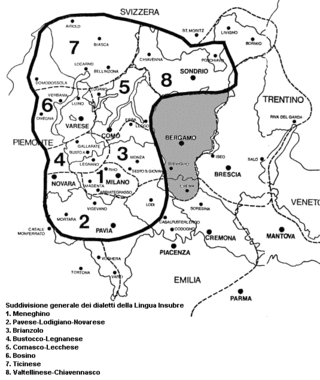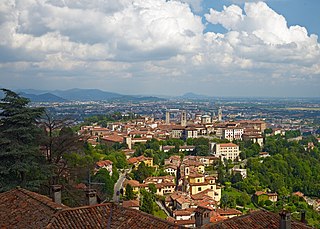
Bergamo is a city in the alpine Lombardy region of Northern Italy, approximately 40 km (25 mi) northeast of Milan, and about 30 km (19 mi) from Switzerland, the alpine lakes Como and Iseo and 70 km (43 mi) from Garda and Maggiore. The Bergamo Alps begin immediately north of the city.
Milanese is the central variety of the Western dialect of the Lombard language spoken in Milan, the rest of its metropolitan city, and the northernmost part of the province of Pavia. Milanese, due to the importance of Milan, the largest city in Lombardy, is considered one of the most prestigious Lombard variants and the most prestigious one in the Western Lombard area.
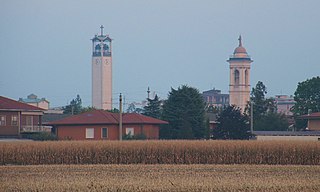
Azzano San Paolo is a comune in the province of Bergamo, in Lombardy, northern Italy.
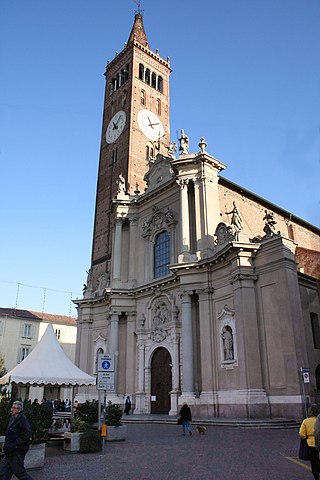
Treviglio is a town and comune in the province of Bergamo, in Lombardy, Northern Italy. It lies 20 kilometres south of the province capital, in the lower territory called Bassa Bergamasca.

Osio Sopra is a comune (municipality) of 5,306 inhabitants in the province of Bergamo, Lombardy, Italy. The history of Osio Sopra has significant links to Osio Sotto's.
Eastern Lombard grammar reflects the main features of Romance languages: the word order of Eastern Lombard is usually SVO, nouns are inflected in number, adjectives agree in number and gender with the nouns, verbs are conjugated in tenses, aspects and moods and agree with the subject in number and person. The case system is present only for the weak form of the pronoun.

Azzone is a comune (municipality) in the Province of Bergamo in the Italian region of Lombardy, located about 90 kilometres (56 mi) northeast of Milan and about 45 kilometres (28 mi) northeast of Bergamo. As of 31 December 2004, it had a population of 458 and an area of 16.8 square kilometres (6.5 sq mi).

Gromo is a comune (municipality) in the Province of Bergamo in the Italian region of Lombardy, located about 80 kilometres (50 mi) northeast of Milan and about 35 kilometres (22 mi) northeast of Bergamo. As of 31 December 2004, it had a population of 1,246 and an area of 20.0 square kilometres (7.7 sq mi).

Pontida is a comune (municipality) in the Province of Bergamo in the Italian region of Lombardy, located about 40 kilometres (25 mi) northeast of Milan and about 13 kilometres (8 mi) northwest of Bergamo. As of 31 December 2004, it had a population of 3,112 and an area of 10.1 square kilometres (3.9 sq mi).

Seriate is a comune (municipality) in the Province of Bergamo in the Italian region of Lombardy, located about 50 kilometres (31 mi) northeast of Milan and about 4 kilometres (2 mi) southeast of Bergamo. As of 31 August 2020, it had a population of 25,200 and an area of 12.4 square kilometres (4.8 sq mi).
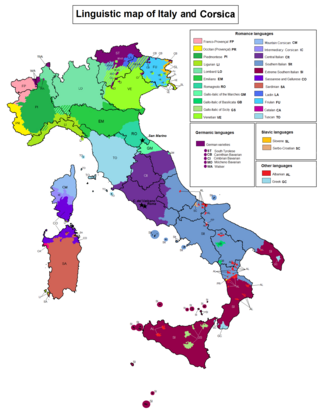
Gallo-Italic of Sicily is a group of Gallo-Italic languages found in about 15 isolated communities of central eastern Sicily. Forming a language island in the otherwise Sicilian language area, it dates back to migrations from northern Italy during the reign of Norman Roger I of Sicily and his successors.
Canzés is a variety of Brianzöö spoken in the commune of Canzo, Italy.
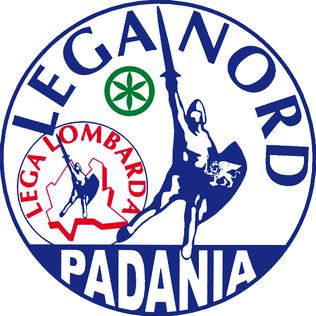
Lega Lombarda, whose complete name is Lega Lombarda per Salvini Premier, is a regionalist political party active in Lombardy. Established in 1984, it was one of the founding "national" sections of Lega Nord (LN) in 1991 and has been the regional section of Lega per Salvini Premier (LSP) in Lombardy since 2020. Along with Liga Veneta, the LL has formed the bulk of the federal party (LN/LSP), which hs been led by Lombards since its foundation.
Eastern Lombard is a group of closely related variants of Lombard, a Gallo-Italic language spoken in Lombardy, mainly in the provinces of Bergamo, Brescia and Mantua, in the area around Cremona and in parts of Trentino. Its main variants are Bergamasque and Brescian.
"Madamina, il catalogo è questo" is a bass catalogue aria from Mozart's opera Don Giovanni to an Italian libretto by Lorenzo Da Ponte, and is one of Mozart's most famous and popular arias.
Trento Longaretti was an Italian painter. He studied at the Brera Academy in the 1930s, where he was taught by renowned artists, including painters Aldo Carpi and Pompeo Borra, and sculptors Francesco Messina and Marino Marini. He stated that painting is an "elixir for long life", and continued to paint and exhibit as a centenarian.

The Cherio is a river of the Province of Bergamo in Lombardy in Italy. The river runs for 32 kilometers (20 mi) and has a basin area of 161 square kilometers (62 sq mi). Its source is at 1,276 meters (4,186 ft) above sea level at Monte Torrezzo near Lake Endine. From there, it flows into the Oglio at Palosco. The main tributary is the Tadone River on its right bank.
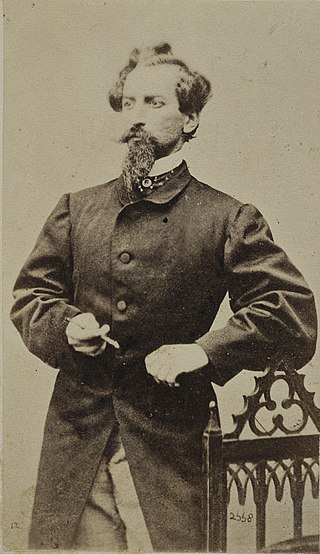
Francesco Nullo was an Italian patriot, military officer and merchant, and a close friend and confidant of Giuseppe Garibaldi. He supported independence movements in Italy and Poland. He was a participant in the Five Days of Milan and other events of the revolutions of 1848 in the Italian states, Sicilian Expedition of the Thousand in 1860 and the Polish January Uprising in 1863. His military career ended with him receiving the rank of general in Poland, shortly before his death in the Battle of Krzykawka.

Liceo Classico Paolo Sarpi is a prominent public high school in Bergamo, Lombardy, northern Italy, because of the methodology combining Ancient Greek language and culture, Latin language and culture, Scientific studies with Philosophy and History. Every year, some 100 students graduate from Sarpi, that is one of Italy's oldest humanistic, scientific and social high schools. Established in 1506 under the name of Accademia della Misericordia, the academy is named after Venetian polymath Paolo Sarpi since 1803.

Lombard nationalism is a nationalist, but primarily regionalist, movement active primarily in Lombardy, Italy. It seeks more autonomy or even independence from Italy for Lombardy and, possibly, all the lands that are linguistically or historically Lombard. During the 1990s, it was strictly connected with Padanian nationalism.
